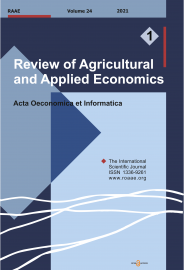KEYWORDS:
food consumption pattern; diet diversity; urbanisation, whole food
DOI NUMBER:
10.15414/raae.2020.23.02.81-91
ABSTRACT:
Rapid changes in climate and urban growth, changing demographics and heterogeneity of urban lifestyles are resulting in a shift in food consumption patterns, with a preference for foods with minimal processing time, quality and taste in Nigeria; but does there exist any relationship between food consumption pattern and reported illnesses among households? For better understanding, this study uses cross-sectional primary data, to thus, examine the relationship between food consumption patterns and the reported illnesses among households in Nigeria. Using a multistage sampling procedure, 250 households in two different local government areas were randomly selected. The study revealed that male household head consumed more plant-based whole food (0.6064) and therefore reported a lower incidence of illnesses (2.18) as compared to the female head whose consumption is lower (0.5644) with higher reported illnesses (3.13). The study further revealed that household members (41-50 years) are most aware of a plant-based whole food (54.17%) with lower reported illness (2.18), whereas members (61-80 years) have the highest reported illness (2.62) because they are the least aware (0.6189). Results also showed that people in the urban areas are prone to more sickness (2.04) than rural areas (1.79) because they are exposed to more choices of processed foods as compared to fresh farm foods available in the rural areas. Households’ consumption patterns were influenced by household head sex, income, location, level of awareness of plant-based whole food, and total food expenditure. Therefore, while the existence of rural-urban food linkages will ensure wider households’ access to quality whole foods needed to reduce reported illnesses; increasing households’ income will enhance diet diversity and reduction in Nigeria’s food insecurity. Also, more attention should be given to educating the people especially through media channels on the benefits of consuming plant-based whole food.
Please Cite this Article as:
Adewale Moses OGUNMODEDE, Bolarin Titus OMONONA (2020) Food As Medicine: Food Consumption Patterns And Reported Illnesses Among Households. Review of Agricultural and Applied Economics. XXIII (Number 2, 2020): 81-91. doi: 10.15414/raae.2020.23.02.81-91
URL for sharing:
https://roaae.org/1336-9261/doi/abs/10.15414/raae.2020.23.02.81-91
FULL TEXT PDF:
▼ direct download link| view online in fullscreen ▲

